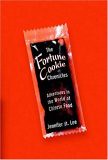First things first-- did you hear
these guys on
Morning Edition yesterday? Yes, I am that dorky that I get music recs from NPR. SHUT UP. I want that CD. Well, it's cheaper if I buy it in MP3 form... anyway...
ALSO! Reasons it is hard to be at work today:
1. It is sunny and nice out. Not too hot. We may even turn off the AC and open the windows tonight!
2.
Fables Vol. 10: The Good Prince is on my doorstep. RIGHT NOW. Too bad my doorstep is a federal district and 1 state away.
And now, a story.
Setting: A dorm room in Nanjing, December 2000
Lauren, an American college student has just gotten a package of Christmas presents from her parents. Several American and Chinese students have just finished decorating the mini-Christmas tree that was included. Lauren is now opening her presents. She opens up a Chinese take out box full of colored fortune cookies from a Van Gogh exhibit at the Philadelphia Art Museum.Xiao Mao: Oooo! These are really tasty! Wait! There's paper in here! What is this?
Jennie: Oh. It's a quotation from Van Gogh. Usually they're kinda brown and they have a fortune or a quotation from Confucius.
Xiao Mao: Why on earth are your desserts quoting Confucius?!
Jennie: Well, you get them for dessert at Chinese restaurants.
Xiao Mao: THESE AREN'T CHINESE!!!
Jennie: They were invented in Chinatown. That box [the goldfish takeaway box] is what you get Chinese or other Asian food in.
Xiao Mao: Really?! What does Italian food come in?
Jennie: Um... a styrofoam container like you get from Aiye's [what we called the restaurant next door]
What's really cool is, at the time, that conversation took place in Chinese, which I couldn't do now.
Anyway, that's all windup to my review of the most wonderful
The Fortune Cookie Chronicles: Adventures in the World of Chinese Food Jennifer 8. Lee
Before you read this book, make sure you have the phone number of your local Chinese delivery place handy. TRUST ME.
In this book, Lee explores 3 major things: the history of fortune cookies (actually, they're
Japanese and internment had a big role in making them a Chinese restaurant favorite), the phenomenon that is Chinese-American food (as opposed to authentic Chinese food), and how Chinese-American food shapes the Chinese immigrant experience and vice versa.
Very readable and fascinating, Lee's journey starts with what happened when an unexpectedly large amount of people got 5 out of 6 numbers right on the Powerball lottery. Turns out they were playing fortune cookie numbers.
Lee traces Chinese restaurants around the world, sometimes following the cookies, sometimes the workers, sometimes the food. She has essays on the evolution of Chop Suey and General Tso's chicken (both very American dishes, while Kung Pao chicken is "authentic" Chinese.) She talks about the advent of delivery and the quest to find the greatest Chinese restaurant in the WORLD. She delves into crimes committed on Chinese deliverymen in New York, and how most Chinese restaurants in the states are staffed from an agency under the Manhattan Bridge. Plus, a great examination on why Jewish people love Chinese food and the story of the Great Kosher Duck Scandal in 1989.
Random things I learned:
There are 2 Chinese restaurants for every McDonald's in the US
Almost all fortunes are written by just 2 guys
Cheap Chinese restaurants in South America are called
chifa (chee-fah) which is derived from the Chinese words
chi fan (chir fan) which means "to eat food"
Almost all of those little soy sauce packets are made by 1 company and don't have soy in them.
The writing is engaging and accessible, but well-researched. I highly recommend it, but just plan on having Chinese for dinner.
Written for adults, but teens will like it too. As long as you feed them.





 We Didn't Start The Fire
We Didn't Start The Fire
